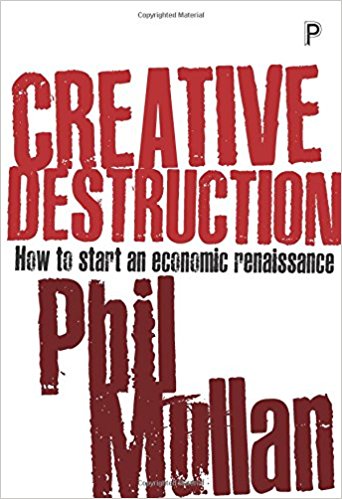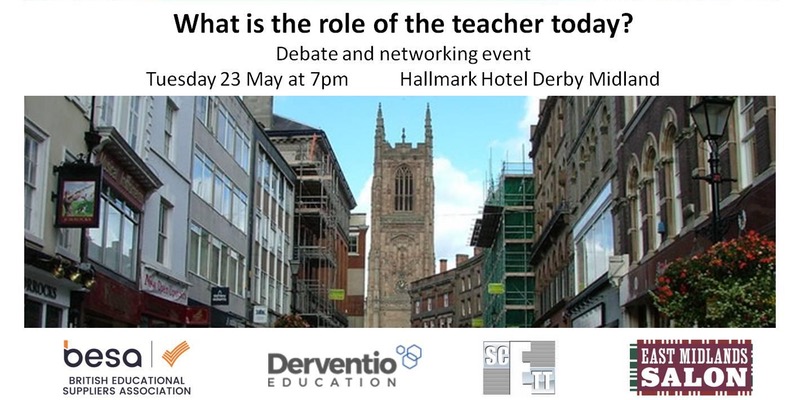Students at London University’s School of Oriental and African Studies (SOAS) are campaigning to ‘decolonise the curriculum’ by including more thinkers of Asian and African origin in place of the current dominance of the ‘dead white males’ of Western philosophy. They complain that the university is a ‘white’ institution promoting the mythical universalism of the European Enlightenment to legitimise continuing racial domination and colonial oppression. Continue reading
Author Archives: Dennis Hayes
Creative Destruction: How to start an economic renaissance
Or speaker, economist Phil Mullan, argues in his new book, Creative Destruction: How to start an economic renaissance that the only way to ensure a better future is to create one. Mullan believes that what is needed is comprehensive economic restructuring backed by political and cultural change. For too long state intervention has been about ‘stabilising’ the economy: creating a corporate dependency that has entrenched economic stagnation.
This restructuring means embracing the painful disruption involved in letting the low-productivity parts of the economy go, to allow new sources of wealth creation to flourish. Crucially, for Mullan, this means seizing both the economic and democratic opportunities offered by Brexit.
So how do we create an economic renaissance? Do we need a bout of creative destruction, or should caution still reign? And does Brexit offer important opportunities to act decisively to renew British capitalism?
Date, Time and Venue: Thursday 22 June at 7 PM in The Parlour of the Brunswick Inn, Derby (£3 waged/£2 unwaged)
About Phil Mullan Continue reading
Is it time to depoliticise art?
“The author Howard Jacobson once wrote that if an artist’s work is political, it only works as art if it transcends politics. Today, curatorial choices seem to have been driven by political perspective rather than artistic merit. Or, as art critic Matthew Collings wrote of the Tate Modern, its overriding message now appears to be ‘Meaning must always entail moralising’.
Worse still – argues our speaker Wendy Earle – “the modern politics of art is trite, the idea of collective art-making and performance art largely uninteresting, and the general slightness and messiness of many of the works irritating and the overall lack of nuance, subtlety and, yes, beauty is wearisome and tedious.”
Date, Time and Venue: 11 May 2017, 7 PM in the Parlour of the Brunswick Inn, Derby. £3 (£2 unwaged).
Wendy writes on the arts and culture for spiked and is convenor of the Institute of Ideas Arts and Society Forum, which promotes open and open-ended discussion of the arts and culture and of the place of arts and culture in society. She works at Birkbeck, University of London, to promote knowledge exchange and public engagement with research in the arts, humanities and social sciences. Previously she worked in educational publishing and at the British Film Institute.
A selection of Wendy’s articles is available in the Spiked Author Archive
What is the role of the teacher today?
This event is organised by the British Educational Suppliers Association (BESA) in partnership with the Standing Committee for the Education and Training of Teachers (SCETT),Deventio Education and the East Midlands Salon.
Increasingly it seems that it is harder than ever before to be a teacher. Almost weekly there are news headlines warning of unprecedented numbers of teachers leaving the profession and of the difficulties of being able to attract new recruits.
Why is this “brain drain” from the teaching profession taking place? Certainly pay and conditions should not be overlooked, especially at a time of tightening budgets, and nor should limited resources. But research suggests that teachers are also feeling like their role is changing. Some argue that teachers are no longer at the heart of schools and that they are becoming technicians, expected to deliver lessons by the manual, with their performance measured and directed by inappropriate numerical targets.
Is the nature of the 21st century classroom such that this shift is inevitable? Or can teachers begin to regain autonomy and build the profession of teaching? Can innovations in technology and resources help teachers better achieve this? How should performance and targets be set and measured in schools?
Join a panel of educationalists to reflect on this important topic that aims to get to the heart of what the role of a teacher is – and should be – today.
Speakers include would be and new teachers as well as leading teachers and educationalists:
- Professor Dennis Hayes, Professor of Education, University of Derby; Honorary Secretary of the Standing Committee for the Education and Training of Teachers (SCETT)
- Dr Nick Daniel, A New Teacher
- Damien Roberts, Director and Co-Founder, Derventio Education
- Ged Rae, Lead Principal at Nottingham Academy
- Beverley Henshaw, a Student and intending Teacher
Chair: Patrick Hayes, Director of BESA
Date, Time and Venue: Tuesday 23 May at 7 PM in the Hallmark Hotel Midland, Derby.
FREE – BUT PRE-BOOKING ESSENTIAL ON EVENTBRITE
NB The discussion will start at 7 PM followed by a drinks reception at 8.30 PM kindly sponsored by Derventio Education.
This event will also be the Midlands launch of the SCETT book The Role of the Teacher Today (£3.50)
Should we ‘decolonise’ the curriculum?
Campaigns such the NUS backed ‘Why is My Curriculum White?’ and #DecoloniseEducation promise to overturn ‘the “Whiteness”, Eurocentric domination and lack of diversity in the curricula…which frames the West as sole producers of universal knowledge’. There is growing support for making courses, faculties, reading lists and ‘core’ subjects more culturally diverse to take account of the diverse backgrounds of an expanded student population. It is argued that ‘White’ curricula are responsible for feelings of ‘isolation, marginalisation, alienation and exclusion’ among non-white students. Continue reading
The dual crisis of migration
“…the fate of migrants is becoming securitised and weaponised. When the European Parliament voted to interrupt Turkey’s EU membership ascension process and plans for visa-free travel, Turkey’s President Recep Tayyip Erdogan threatened the EU that he would not stop migrants travelling to Europe ‘Listen to me: these border gates will be opened if you go any further’ (BBC, 25 November 2016).” Continue reading
The dangerous rise of anti-democracy
“The spread of discontent, disengagement and disaffection across Western societies has revealed the yawning chasm between power and the people…The reaction against this discontent has brought the historical fear and loathing of the masses bubbling back to the surface. Demos-phobia is back in fashion” (Mick Hume) Continue reading
The future of free speech: will tackling ‘radicalisation’ mean the death of debate?
The government’s ‘Prevent’ strategy sees the sudden psychological ‘radicalisation’ of vulnerable children and young people as the cause of today’s apparently meaningless acts of terrorism. It has turned teachers and lecturers into spies looking out for signs of ‘radicalisation’ including signs of unusual behaviour and mental illness. ‘Prevent’ has many critics who often condemn it as ‘Islamophobic’ for targeting Muslims, while its supporters claim that the aim is to prevent terrorism in all its forms including that of extreme right or ‘Fascist’ groups and that of individual fanatics. Continue reading
Knowledge versus Skills: the great education debate 2016
Do we want children to learn ‘the best that has been known and thought in the world’ or do we want them to have the skills necessary for work and life in the 21st Century? Why impose an elite, Victorian curriculum on children today? Children need to be empowered to unleash their creativity and to develop the soft skills for a new world and a new workplace. Do really need latter day Gradgrinds pouring ‘facts’ into empty vessels and then examining them? Continue reading
The autumn programme 2016
The East Midlands Salon is taking a summer break but will be back in the autumn with a whole new programme. We begin with a special event in September:
Wednesday 28 September – What is the role of a Salon in the 21st Century? Continue reading



